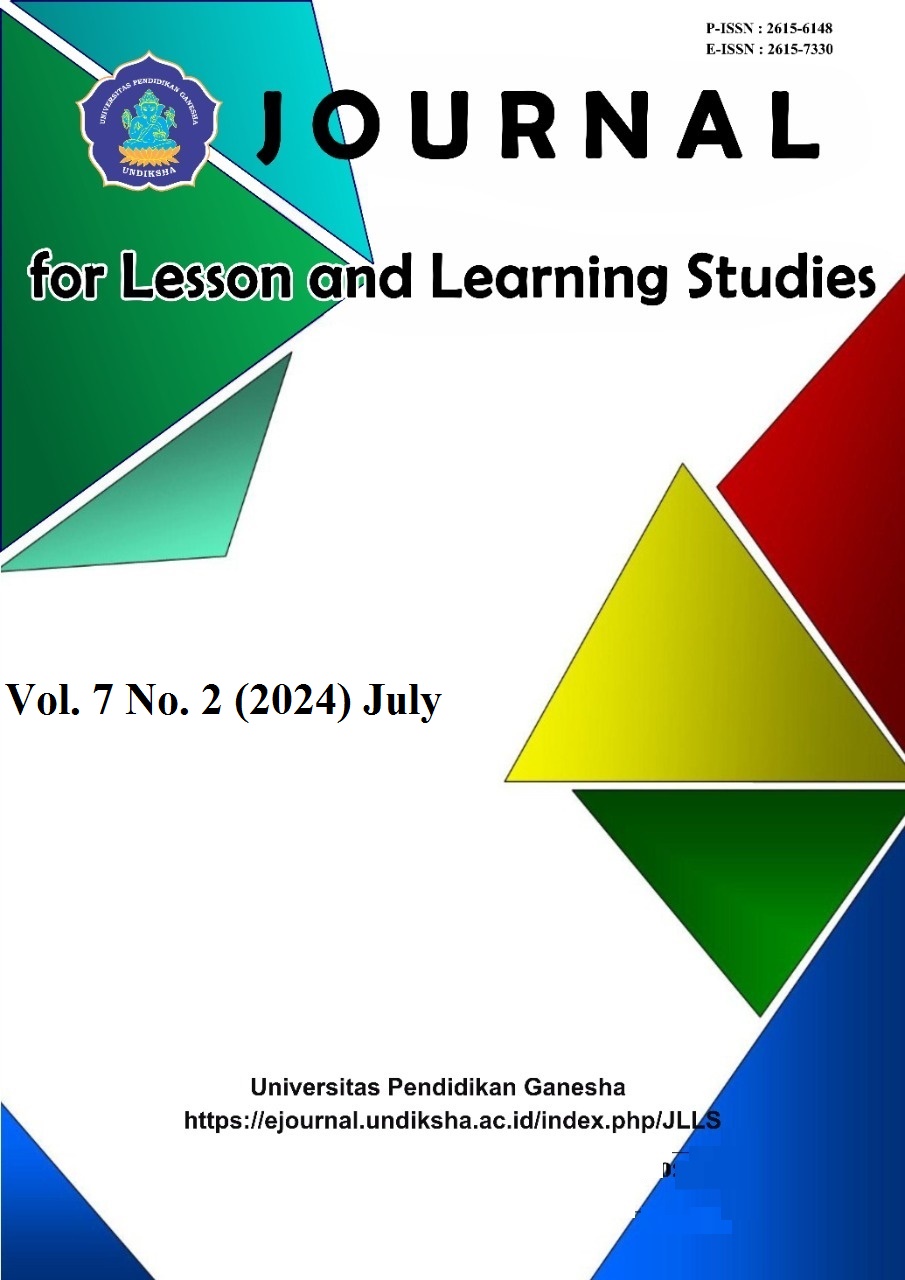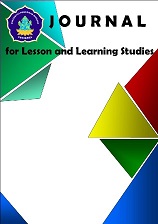The Impact of Team Quiz Method on Students' Ability to Solve Higher Order Thinking-based Questions in Social Studies Learning
DOI:
https://doi.org/10.23887/jlls.v7i2.78966Kata Kunci:
Team Quiz, Social Studies , HOTSAbstrak
The lack of precise application of learning methods causes students' low ability to solve Social Sciences questions based on higher-order thinking Skills (HOTS). Therefore, appropriate learning methods are needed as a solution to overcome this problem. The research aimed to test the effect of applying the Team Quiz method on students' ability to solve HOTS-based social studies questions on ASEAN material. This research uses a quasi-experimental method with a pretest-posttest nonequivalent control group design. The research sample consisted of 36 students distributed into 2 classes. Data collection techniques through tests. Data analysis techniques using parametric statistics through normality tests, homogeneity tests, and hypothesis tests. The results showed that the Shapiro-Wilk normality test was > 0.05 and the homogeneity test had a significant value (Sig.) > 0.05. This means that the research data is normally distributed and the two groups have the same level of variance. Hypothesis test results (Independent Sample T-Test) with a sig value. (2-tailed) 0.000 < 0.05. The average N-Gain score in the experimental class was 63.99% with a minimum score of 53.33 and a maximum score of 80.00, included in the quite effective category. On the other hand, the average N-Gain score in the control class was only 23.37% with a minimum score of 15.38 and a maximum score of 38.46, included in the ineffective category. Thus, it can be concluded that there is a significant influence of the application of the Team Quiz method on students' ability to solve HOTS-based social studies questions on ASEAN material.
Referensi
Abdillah, F., & Ramadhan, Y. M. (2023). Pengaruh Pembangunan Ekonomi Terhadap Sumber Daya Manusia Di Indonesia Pada Era Modern. Benefit: Journal of Bussiness, Economics, and Finance, 1(2), 54–68. https://doi.org/10.37985/benefit.v1i2.20.
Al Asadullah, S., & Nurhalin. (2021). Peran pendidikan karakter dalam membentuk kemampuan berpikir kritis generasi muda Indonesia [The role of character education in shaping the critical thinking skills of Indonesia’s young generation]. Kaisa : Jurnal Pendidikan Dan Pembelajaran, 1(1), 12–24. http://download.garuda.kemdikbud.go.id/article.php?article=2346715&val=22611.
Ambar, A., Sufa, F. F., & Handini, O. (2023). Analisis Kemampuan Berpikir Kritis pada Muatan Pembelajaran IPS Tematik 4 Kelas V SDN 02 Cangakan Karanganyar. 3, 10372–10382. https://doi.org/10.31004/innovative.
Anakin, M., & McDowell, A. (2021). Enhancing Students’ Experimental Knowledge with Active Learning in a Pharmaceutical Science Laboratory. Pharmacy Education, 21, 29–38. https://doi.org/10.46542/pe.2021.211.2938.
Anderson, L. W., & Krathwohl, D. R. (2011). A Taxonomy for Learning, Teaching, and Assessing; A revision of Bloom’s Taxonomy of Education Objectives. Addison Wesley Longman Inc.
Anggraini, D., Khumaedi, M., & Widowati, T. (2020). Validity and reliability contents of independence assessment instruments of basic beauty students for class X SMK. Journal of Research and Educational Research Evaluation, 9(1), 40–46. https://doi.org/10.15294/jere.v9i1.42558
Aprilia, S. (2018). Evaluasi Berbasis High Order Thingking Skills Dalam Pembelajaran Tematik Di Sd Kelas Tinggi. Prosiding SNPS (Seminar Nasional Pendidikan Sains), 149–154. http://repository.itspku.ac.id/id/eprint/324
Asy’ari, A., Saefi, M., & Cholid, F. (2023). Strategi PQ4R Strategi PQ4R Terintegrasi Model Team Quiz Berbasis E-Learning dalam Memberdayakan Keterampilan Berpikir Kritis dan Aktivitas Siswa. BIOEDUSAINS:Jurnal Pendidikan Biologi Dan Sains, 6(1), 80–98. https://doi.org/10.31539/bioedusains.v6i1.5304.
Asyifa, D. I. (2020). Exploring Indonesian Gen Z Digital Reading Issues. UICELL Conference Proceeding, 2012(December), 10–18.
Aziz, M., & Rawian, R. (2022). Modeling higher order thinking skills and metacognitive awareness in English reading comprehension among university learners. Frontiers in Education, 7. https://doi.org/10.3389/feduc.2022.991015.
Cabatan, M. C. C., Grajo, L. C., & Sana, E. A. (2020). Development and content validation of the adaptation process in academia questionnaire for occupational therapy educators. Acta Medica Philippina, 54(2), 142–150. https://doi.org/10.47895/amp.v54i2.1537.
Ekaprasetya, S. N. A., Salsabila, S. R., Arifin, M. H., & Wahyuningsih, Y. (2022). Peran Pembelajaran IPS dalam Meningkatkan Keterampilan Sosial Peserta Didik Sekolah Dasar. Jurnal Pendidikan Tambusai, 6(1), 3987–3992. https://doi.org/10.31004/jptam.v6i1.3487.
Fitria, D., Lestari, M., Aisyah, S., Renita, R., Dasmini, D., & Safrudin, S. (2021). Meta-Analisis Pendekatan Pembelajaran Konstruktivisme dalam Meningkatkan Hasil Belajar Siswa Pada Pembelajaran IPS Sekolah Dasar. Jurnal Simki Economic, 4(2), 192–199. https://doi.org/10.29407/jse.v4i2.65.
Gunartha, I. W. (2024). Peningkatan Kemampuan Berpikir Kritis Siswa Di Era Global Abad Ke-21. Widyadari, 25(1), 133–147. https://doi.org/10.59672/widyadari.v25i1.3660.
Hainora Hamzah, Mohd Isa Hamzah, & Hafizhah Zulkifli. (2022). Systematic Literature Review on the Elements of Metacognition-Based Higher Order Thinking Skills (HOTS) Teaching and Learning Modules. Sustainability (Switzerland), 14(2), 1-15. https://doi.org/10.3390/su14020813.
Hamdi & Bahrudin. (2014). Metode Penelitian Kuantitatif dan Aplikasi dalam Pendidikan. Deepublish.
Hariani, F., Tahir, M., & Oktaviyanti, I. (2023). Analisis Kesulitan Siswa dalam Menyelesaikan Soal HOTS Pada Muatan IPS Kelas V di SDN 12 Ampenan. Jurnal Ilmiah Profesi Pendidikan, 8(1), 119–124. https://doi.org/10.29303/jipp.v8i1.1096.
Indriyana, B. S., & Kuswandono, P. (2019). Developing Students Higher Order Thinking Skills (HOTS) in Reading: English Teachers Strategies in Selected Junior High Schools. JET (Journal of English Teaching), 5(3), 204. https://doi.org/10.33541/jet.v5i3.1313.
Jain, V., & Jain, P. (2022). From Industry 4.0 to Education 4.0: acceptance and use of videoconferencing applications in higher education of Oman. Journal of Applied Research in Higher Education, 14(3), 1079–1098. https://doi.org/10.1108/JARHE-10-2020-0378.
Kamil, B., Velina, Y., & Kamelia, M. (2019). Students’ Critical Thinking Skills in Islamic Schools: The Effect of Problem-Based Learning (PBL) Model. Tadris: Jurnal Keguruan Dan Ilmu Tarbiyah, 4(1), 77–85. https://doi.org/10.24042/tadris.v4i1.4212.
Lestari, I. D., Japar, M., & Sapriati, A. (2022). The Effect of Problem Posing, CUPs and Critical Thinking on HOTS-Based Learning Achievement. AL-ISHLAH: Jurnal Pendidikan, 14(3), 4371–4380. https://doi.org/10.35445/alishlah.v14i3.737.
Mardhiyah, R. H., Aldriani, S. N., Chitta, F., & Zulfikar, M. R. (2021). Pentingnya keterampilan belajar di abad 21 sebagai tuntutan dalam pengembangan sumber daya manusia. Lectura: Jurnal Pendidikan, 12(1), 29–40. https://doi.org/10.31849/lectura.v12i1.5813.
Marian, F., & Lestari, F. (2024). Peningkatan Kemampuan Pemecahan Masalah Menggunakan Model Team Quiz Dalam Blended Learning. Wahana Didaktika: Jurnal Ilmu Kependidikan, 22(1), 229–241. https://jurnal.univpgri-palembang.ac.id/index.php/didaktika/article/view/15055.
Maulidiawati, M., Murtafiah, M., & Indrawati, N. (2022). Pengaruh Model Pembelajaran Aktif Type Quiz Team Terhadap Kemampuan Pemecahan Masalah Matematika. Jurnal Lebesgue : Jurnal Ilmiah Pendidikan Matematika, Matematika Dan Statistika, 3(3), 647–652. https://doi.org/10.46306/lb.v3i3.183.
Morrar, R., Arman, H., & Mousa, S. (2017). The fourth industrial revolution (Industry 4.0): A social innovation perspective. Technology Innovation Management Review, 7(11), 12–20. https://timreview.ca/sites/default/files/Issue_PDF/TIMReview_November2017.pdf.
Parappilly, M., Woodman, R. J., & Randhawa, S. (2021). Feasibility and Effectiveness of Different Models of Team-Based Learning Approaches in STEMM-Based Disciplines. Research in Science Education, 51, 391–405. https://doi.org/10.1007/s11165-019-09888-8.
Polit, D. F., & Beck, C. T. (2006). The content validity index: are you sure you know what’s being reported? Critique and recommendations. Research in Nursing & Health, 29(5), 489–497. https://doi.org/10.1002/nur.20147.
Polit, D. F., Beck, C. T., & Owen, S. V. (2007). Is the CVI an acceptable indicator of content validity? Appraisal and recommendations. Research in Nursing & Health, 30(4), 459–467. https://doi.org/10.1002/nur.20199.
Polizzi, G. (2020). Digital literacy and the national curriculum for England: Learning from how the experts engage with and evaluate online content. Computers and Education, 152(February), 103859. https://doi.org/10.1016/j.compedu.2020.103859.
Prachanant, N. (2012). Needs Analysis on English Language Use in Tourism Industry. Procedia - Social and Behavioral Sciences, 66, 117–125. https://doi.org/10.1016/j.sbspro.2012.11.253.
Putera, P. B., Widianingsih, I., Rianto, Y., Ningrum, S., & Suryanto, S. (2022). Human Resources of Research and Innovation in Indonesia: Reality, Policy Strategy, and Roadmap. Jurnal Perencanaan Pembangunan: The Indonesian Journal of Development Planning, 6(3), 386–401. https://doi.org/10.36574/jpp.v6i3.365.
Putra & Edora. (2021). Penerapan Metode Pembelajaran Team Quiz untuk Meningkatkan Prestasi Belajar Siswa SMPN19 Bengkulu Selatan. Jurnal Pendidikan, 9(1), 99–107. https://doi.org/10.36232/pendidikan.v9i1.682.
Sari, S. Y., Loliyana, L., & Perdana, R. (2022). Implementasi Strategi Team Quiz Terhadap Kemampuan Pemecahan Masalah Dan Hasil Belajar Matematika. Jurnal Pendidikan Matematika Universitas Lampung, 10(2), 157–169. https://doi.org/10.23960/mtk/v10i2.pp157-169.
Sellars, M. (2012). Teachers and Change: The Role of Reflective Practice. Procedia - Social and Behavioral Sciences, 55, 461–469. https://doi.org/10.1016/j.sbspro.2012.09.525.
Sugianto, S. (2022). Faktor-Faktor Yang Mempengaruhi Jumlah Kunjungan Wisatawan Mancanegara (Wisman) Di Provinsi Nusa Tenggara Barat. Jurnal Locus Penelitian Dan Pengabdian, 1(2), 48–59. https://doi.org/10.58344/locus.v1i2.14.
Sugiyono. (2018). Metode Penelitian Kuantitatif, Kualitatif, dan R&D. Alfabeta.
Taber, K. S. (2018). The Use of Cronbach’s Alpha When Developing and Reporting Research Instruments in Science Education. Research in Science Education, 48(6), 1273–1296. https://doi.org/10.1007/s11165-016-9602-2.
Vari & Bramastia. (2022). Pemanfaatan Augmented Reality untuk Melatih Keterampilan Berpikir Abad 21 Di Pembelajaran IPA. INKUIRI: Jurnal Pendidikan IPA, 11(2), 131–136. https://doi.org/10.20961/inkuiri.v10i2.57256.
Vinet, L., & Zhedanov, A. (2011). A “missing” family of classical orthogonal polynomials. Journal of Physics A: Mathematical and Theoretical, 44(8), 90–96. https://doi.org/10.1088/1751-8113/44/8/085201.
Widana, W. (2017). Modul Penyusunan Soal Higher Order Thinking Skill (HOTS). Paper Knowledge . Toward a Media History of Documents, 3(April), 49–58. https://core.ac.uk/download/pdf/304179719.pdf.
Unduhan
Diterbitkan
Cara Mengutip
Terbitan
Bagian
Lisensi
Hak Cipta (c) 2024 Neneng Eliana

Artikel ini berlisensiCreative Commons Attribution-ShareAlike 4.0 International License.
Authors who publish with the Journal for Lesson and Learning Studies agree to the following terms:
- Authors retain copyright and grant the journal the right of first publication with the work simultaneously licensed under a Creative Commons Attribution License (CC BY-SA 4.0) that allows others to share the work with an acknowledgment of the work's authorship and initial publication in this journal.
- Authors are able to enter into separate, additional contractual arrangements for the non-exclusive distribution of the journal's published version of the work (e.g., post it to an institutional repository or publish it in a book), with an acknowledgment of its initial publication in this journal.
- Authors are permitted and encouraged to post their work online (e.g., in institutional repositories or on their website) prior to and during the submission process, as it can lead to productive exchanges, as well as earlier and greater citation of published work. (See The Effect of Open Access)





